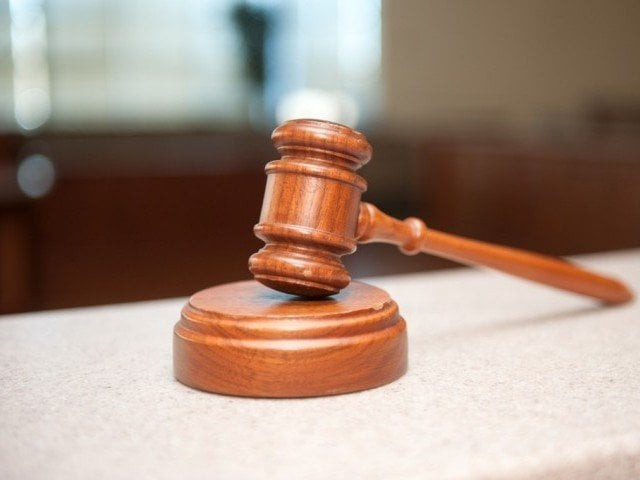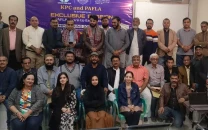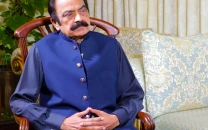PBC accuses superior judiciary of biasness
Chief Justice says ready to talk with bars to chalk out objective criteria for judges' appointment

The Pakistan Bar Council (PBC) has accused the superior judiciary of weakening the democratic institutions.
PBC representative Amjad Shah while addressing a ceremony on the start of the New Judicial Year (2021-22) maintained that the judiciary had been through ups and down during different era of judicial history. However, the judiciary has failed to maintain the perception of its independence and impartiality, he said.
Shah also referred to a US report wherein questions were raised on the independence and impartiality of Pakistan’s judiciary.
Shah said the impression was getting deeper that instead of strengthening, the judiciary by exercising its discretionary powers had weakened the democratic institutions. Even the elected prime ministers were either hanged or disqualified in contempt cases, he said.
Referring to the ouster of Nawaz Sharif, Shah opined that Panamagate was a “unique case” in the country’s judicial history wherein constitutional limits were “ignored” and the elected premier was sent home on the basis of iqama.
He opined that that the judiciary could not play an effective role to stop the victimisation of opposition parties’ leaders by NAB.
He observed that the voice of media was being suppressed and urged the Supreme Court to “ensure fundamental rights of citizens and freedom of press”.
He raised his voice for missing persons and stressed the need to resolve the issue of enforced disappearances, saying people were picked up without being produced in the courts.
He also questioned the judiciary for not fixing Pervez Musharraf treason case.
Meanwhile, Chief Justice Gulzar Ahmed said the protest organised by the lawyers community on September 9 against the appointment of junior judges to the Supreme Court was uncalled for.
The chief justice made the remarks while addressing a ceremony to mark the beginning of the New Judicial Year.
The top judge said that the apex court and the superior judiciary were open to talks with the lawyers to chalk out effective and objective criteria for the elevation of judges to the top court.
The chief justice said even though he was “always” ready to meet the representatives of the lawyer community for an amicable solution to their problems, this time no one approached him regarding the appointment of judges.
He wondered what motive was behind the lawyers’ agitation on SC premises last week.
The two major pillars of the judiciary -- the bench and the bar -- have been drifting apart following differences over the appointment of judges to the apex court.
The chief justice said that there was an increase in the “pendency of cases” due to coronavirus, adding that the judges “spent a major part of the year trying to implement plan of action to deal with this problem”.
“In addressing this problem, my brother judges and the staff of this court have provided full support and cooperation and worked with dedication and zeal to ensure the provision of justice,” the top judge added.
E-courts
The chief justice said that e-courts proved beneficial in addressing problems faced by litigants and parties to the case. “In the previous judicial year 2019-2020, one of the main reasons we identified for the backlog of cases was adjournments given to advocates who were unable to reach Islamabad due to various reasons,” he added.
Read More: PBC delays in appointing nominee to JCP
“The video-link facility has played an active and key part in ensuring the smooth operation of our judicial functions throughout the pandemic and has prevented unnecessary adjournments,” the CJP added.
Backlog
At the start of the previous judicial year, a total of 45,644 cases were pending, whereas 20,910 fresh cases were instituted, the chief justice said.
During the outgoing judicial year, the court decided 12,968 cases, including 6,797 civil petitions, 1,916 civil appeals, 459 civil review petitions, 2,625 criminal petitions, 681 criminal appeals, 37 criminal review petitions and 100 criminal original petitions.
“I may mention here that during the previous judicial year, the court had to hear many cases involving constitutional interpretation and many larger benches were constituted for that purpose... it affected the overall disposal of regular petitions and appeals.”
Besides, the repeated waves of Covid also affected the rate of disposal of cases, he said, adding that “due to the said limitations” the number of pending cases increased slightly.
The Human Rights Cell, established in the Supreme Court, has continued to function. However, very few new cases were registered and an effort was made to regularly hear the pending cases and pass appropriate orders to protect the fundamental rights.
Administrative issues
On December 23, 2020, the National Judicial (Policy Making) Committee conducted performance review of superior and district judiciaries regarding the pendency, institution, and disposal of cases for 2020, as well as analysis of trends for pendency, institution and disposal for the last 10 years.
“The Committee also reviewed the vacancy position in superior and district judiciary... and it recommended to take up the matter with the Peshawar High Court to increase the number of judges therein after the merger of the erstwhile Federally Administered Tribal Areas.”
On December 24, 2020, a meeting of the Law and Justice Commission of Pakistan was held to review various proposed legislative reforms.
“The Commission reviewed the performance of the LJCP Secretariat, along with reports and research papers on various law reforms. I constituted several committees to evaluate the proposals and their workability,” the chief justice said.
During the said year, the National Judicial Automation Unit (NJAU) was also established, he added.
“This Committee, under the Chairmanship of now Retired Justice Mushir Alam launched the National Online Dashboard (NOD) and the E-Case Information Management System (e-CIMS)” to facilitate the litigants, he further said.
"The Law and Justice Commission of Pakistan has constituted the District Legal Empowerment Committees (DLECs) to provide free legal aid to deserving litigants."
“Until the end of [previous] judicial year, funds of Rs64.2 million have been released to 124 DLECs constituted in four provinces and the federal capital,” the top judge said, adding that 11 new DLECS were established in Kurram, North Waziristan, South Waziristan, Orakzai and Kolai Pallas.
Meanwhile, Attorney General for Pakistan Khalid Jawed Khan urged the Supreme Court that perception of “court packing” and pick and choose regarding judges appointment must be dispelled.
"The perception, whether actual or imaginary, that there is Court packing or pick and choose in the appointment process, resulting in by passing of senior judges of High Courts is so pervasive and destructive of this august institution, that even if it is completely imaginary, it has to be firmly dispelled to everyone’s satisfaction. An objective criteria reached with the consensus of the Bar and the Bench seems to be the only and unavoidable solution," the AGP said in his address in full court ceremony regarding start of New Judicial Year (2021-22).
"I would propose that the agreed criteria be settled through judicial order of this Court. Hence the pending petitions filed by late Chief Justice Waqar Ahmed Seth and Sindh High Court Bar Association may be taken up at the earliest by this Court so as to remove all doubts and ambiguities left by the judgment in the case of Supreme Court Bar Association vs Federation of Pakistan PLD 2002 SC 939. Posthumous justice is better than no justice", he added.
"The question that is today souring this relationship the most is an old question of seniority versus merit in the appointment of judges in the Supreme Court. The fact remains that seniority and merit are not two opposing concepts but can be easily blended together. While seniority carries its own legitimacy but the fact remains that it is more of an accident or a coincidence of birth or placement than an achievement relatable to performance or other human traits which distinguish people. Hence the need for other meritorious considerations such as performance in high court, independence, commitment to democracy and fundamental rights, temperament, capacity, diligence, ability and willingness to deliver and so on. Transparency requires that objective criteria be evolved for appointments in high courts as well as Supreme Court leaving no room for complaints of nepotism or favouritism."



















COMMENTS
Comments are moderated and generally will be posted if they are on-topic and not abusive.
For more information, please see our Comments FAQ